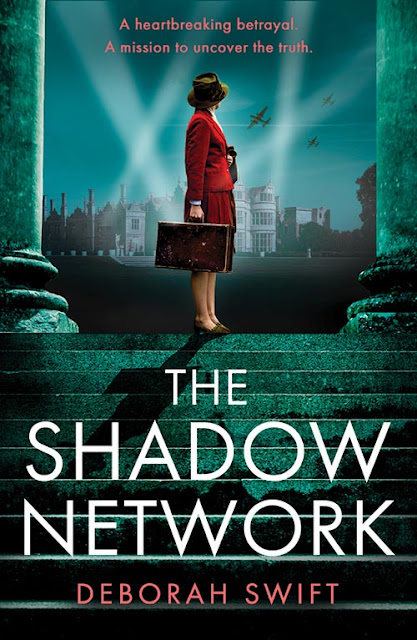It was all very mysterious, being summoned like this by letter. After all, he was no se to anyone, hobbling about with two smashed legs. These days it took him fifteen minutes to struggle up a flight of stairs. Neil hoped whatever it was would have something to do with coding, because that was what he did before – well, before that awful year when his life had gone off the rails. He shuddered. Just the thought of it had the power to make him sweat. If they were going to drag all that up again, he’d be in serious trouble.
He concentrated on the view through the dusty window. The car turned left between two sentries, and down a short drive to a country house with a church tower at the front.
‘Wavendon Tower,’ Harrison said, as the wheels crunched to a halt on the gravel. ‘Isn’t it spectacular? I’ll take you in to meet Mr Delmer.’
Neil eased himself out onto a gravelled drive. So not Bletchley and coding after all. The plot thickened.
He was led through a gloomy corridor and into a library where a coal fire gave out sooty smoke in the corner.
Delmer, bear-like and bespectacled, stood up with his hand out and a big smile. Neil leant his stick against a chair and grasped hold. Delmer’s handshake was firm and warm. He had that air of easy confidence born of getting what he wanted.
‘Do sit,’ he said. ‘Harrison will bring us some tea.’
Neil was glad to get off his feet and into one of the leather armchairs.
‘I expect you’re wondering what this is all about,’ Mr Delmer said, wedging himself into a too-small armchair. ‘Have you heard of the Political Warfare Executive?’
‘I’ve heard of it, yes, but I’m not really sure what they do.’
‘Ah. Exactly the position I was in a few weeks ago.’ Delmer laughed. He had a broad open face and eyes that were very alive. He was a little overweight, which was unusual in these times, and balding already, though he was only, Neil guessed, in his late thirties. ‘Basically,’ Delmer went on, ‘it’s psychological warfare we’ll be involved in. You know I was a journalist?’
The ‘we’ bothered him, as if his job was a foregone conclusion, but Neil nodded.
‘Well, now I’m going into broadcasting. Radio. We’re going to make a radio station that will spout our propaganda. With me so far?’ He didn’t wait for Neil’s answer. ‘The idea is to undermine Hitler – pretend to be his fanatical supporters, grow a base of his listeners, and then, once we’ve reeled them in, do everything we possibly can to damage German morale.’
‘If you’re looking at me to do this,’ Neil said, ‘I don’t think my spoken German’s good enough. Not for radio broadcasting.’
‘No, Mr Callaghan. We’re going to use captured prisoners of war, people who’ve fled Germany and have a grudge. They’ll all be native speakers. The thing is, we need someone listening in; someone who can make sure these people are following the script. A chap who can alert us if they say or do anything out of order. A minder, if you like. And of course I can’t be everywhere, so I need some German-speaking helpers. People who pick things up quickly. Are you willing to have a go? It’s a desk job. Beauclerk thought it might suit, since you’re . . . less mobile these days.’
Just at that moment, Harrison brought in a tray of tea. She gave him a wink before passing him the plate of biscuits.
Neil wondered if Beauclerk had told Delmer about his less-than-salubrious past. It seemed not, and he certainly wasn’t going to enlighten him. After last year, he wasn’t sure he could cope with any more Germans, even the thought was terrifying.
‘I’m not sure I’m really ready for it,’ he said, searching for an excuse. ‘The bomb really knocked my confidence. I have bad days, you know, when I can’t—’
‘I don’t think I’m being clear. We need you, Mr Callaghan. And MI5 said you would be glad to help, particularly as you made a few . . . how shall we say? A few faux pas in your last post.’
So Delmer did know. And now he was piling on the pressure. Guilt kicked in, as Delmer must have known it would. And shame. Neil straightened his tie and tried to think positively. Maybe this time it wouldn’t all go belly-up and he’d be able to do something positive for his country. Reparation for his wrongs, if you like.
He had no choice. And somehow that was a relief. That he didn’t have to choose a side.
‘I’m in,’ he said. He grabbed a Marie biscuit from the plate and took a bite.
Pick up your copy HERE!
Deborah Swift
Deborah Swift is the English author of eighteen historical novels, including Millennium Award winner Past Encounters, and The Lady’s Slipper, shortlisted for the Impress Prize.
Her most recent books are the Renaissance trilogy based around the life of the poisoner Giulia Tofana, The Poison Keeper and its sequels, one of which won the Coffee Pot Book Club Gold Medal. Recently she has completed a secret agent series set in WW2, the first in the series being The Silk Code.
Deborah used to work as a set and costume designer for theatre and TV and enjoys the research aspect of creating historical fiction, something she loved doing as a scenographer. She likes to write about extraordinary characters set against the background of real historical events. Deborah lives in North Lancashire on the edge of the Lake District, an area made famous by the Romantic Poets such as Wordsworth and Coleridge.
Connect with Deborah:










Thank you so much for hosting Deborah Swift on your lovely blog today.
ReplyDeleteTake care,
Cathie Dunn xx
The Coffee Pot Book Club
Thank you for hosting me Mary.
ReplyDelete